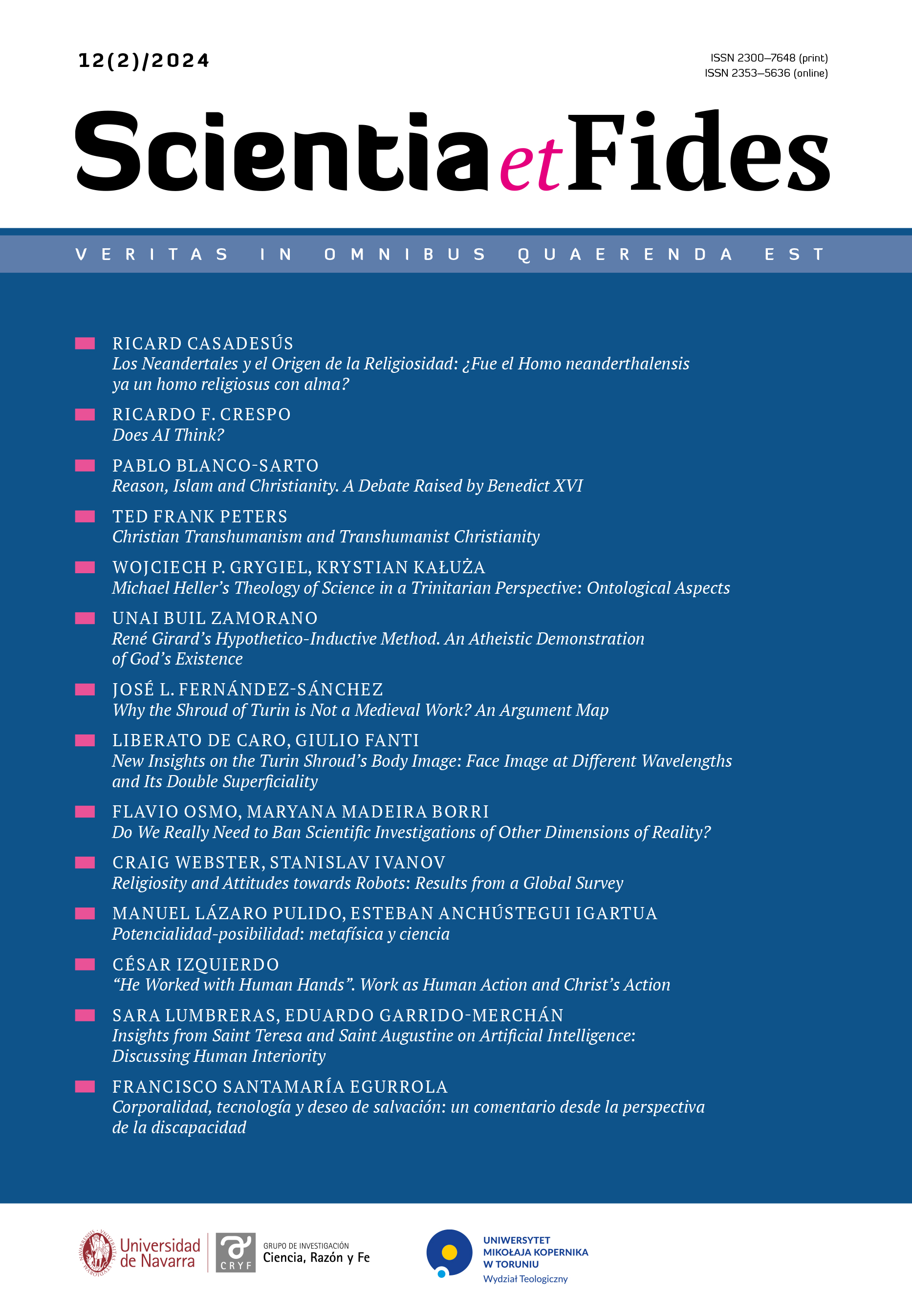Neanderthals and the Origin of Religiosity:
Was Homo neanderthalensis already a Homo religiosus with a Soul?
DOI:
https://doi.org/10.12775/SetF.2024.013Keywords
Homo neanderthalensis, origin of religiosity, the beginning of spirituality, symbolic capacity, divine grace, soulAbstract
In this paper we want to go deeper into the current scientific data on Homo neanderthalensis in order to elucidate, from the biological, anthropological, anatomical, physiological and, finally, theological dimensions, the possibility that Neanderthals could have some form of spirituality or religiosity. Although God the Creator, moved by his universal salvific will, wanted to establish, by grace, a relationship with all human beings from their origins, we show in this work that the Neanderthals, those hominids contemporary to the first anatomically modern humans (Homo sapiens), could have had some form of spirituality or religiosity, from their intellectual, abstractive and symbolic capacity, could have –and had– a primitive and rudimentary religious behavior. Although they were not yet capable of explicit divine revelation, they were on the way to get a transcendent capacity. So the temporal origin of that human-divine relationship (in addition to the dependence on Creation) and of the gift of divine grace should be placed beyond 200,000 years.
References
Aguirre, Emiliano. 1966. “Las primeras huellas de lo humano.” In Evolución, edited by Miquel Crusafont, Bermudo Meléndez, and Emiliano Aguirre, 616–75. Madrid: Biblioteca de Autores Cristianos.
Biblia de Jerusalén. 2019. Bilbao: Desclée de Brouwer.
Buck, Laura T., and Christopher B. Stringer. 2016. “Homo, diversification of.” In The Encyclopedia of Evolutionary Biology, edited by Richard M. Kliman, vol. 2, 225–35. Oxford: Academic Press.
Casadesús, Ricard. 2016. “Creación y Evolución. Fundamentos para una filosofía de la creación evolutiva.” PhD diss., Universitat Ramon Llull.
Concilio Vaticano II. 1962–1965. Ciudad del Vaticano: Editrice Vaticana.
Conde-Valverde, Mercedes, Ignacio Martínez, Rolf M. Quam, Manuel Rosa, Alex D. Velez, Carlos Lorenzo, Pilar Jarabo, José-María Bermúdez de Castro, Eudald Carbonell, and Juan-Luis Arsuaga. 2021. “Neanderthals and Homo sapiens had similar auditory and speech capacities.” Nature Ecology and Evolution 5: 609–15.
Choza, Jacinto. 2016. El culto originario: La religión paleolítica. Sevilla: Thémata.
De Vera, Jorge Ignacio. 2016. “Los orígenes de la religión.” Accessed November 30, 2022. https://cualeslaverdaderahistoriadelabiblia.blogspot.com.
Diez Martín, Fernando. 2011. Breve historia de los neandertales. Madrid: Nowtilus.
Fernández Alonso, Ariana. 2014. “Los enterramientos neandertales en Eurasia: Una comparación con los Homo sapiens arcaicos.” Grad. diss., Universidad de Cantabria.
Gaine, Simon F. 2021. “Did Christ die for Neanderthals?” New Blackfriars 102: 225–38.
Hayden, Brian. 2003. A prehistory of Religion. Shamans, sorcerers and saints. Washington: Smithsonian Institution.
Krause, Johannes, Carles Lalueza-Fox, Ludovic Orlando, Wolfgang Enard, Richard E. Green, Hernán A. Burbano, Jean-Jacques Hublin, Catherine Hänni, Javier Fortea, Marco de la Rasilla, Jaume Bertranpetit, Antonio Rosas, and Svante Pääbo. 2007. “The derived FOXP2 variant of modern humans was shared with Neanderthals.” Current Biology 17: 1908–12.
May, Andreas. 2022. “Since when have humans had a soul?” HTS Theological Studies 78: 157–63.
Moritz, Joshua M. 2015. “Does Jesus Save the Neanderthals? Theological Perspectives on the Evolutionary Origins and Boundaries of Human Nature.” Dialog: A Journal of Theology 54: 51–60.
Putz, Oliver. 2005. “Evolutionary Biology in the Theology of Karl Rahner.” Philosophy & Theology 17: 85–105.
Rahner, Karl. 1961. “Die Hominisation als theologische Frage.” In Das Problem der Hominisation. Über den biologischen Ursprung des Menschen, Paul Overhage and Karl Rahner, 13–90. Friburgo–Basilea–Viena: Herder.
Rahner, Karl. 1976. Grundkurs des Glaubens. Einführung in den Begriff des Christentums. Friburgo de Brisgovia: Herder.
Ratzinger, Joseph. 2011. Fe y Ciencia. Un diálogo necesario. Santander: Sal Terrae.
Rivera, Ángel. 2009. “La transición del Paleolítico medio al superior. El neandertal.” Arqueoweb. Revista sobre Arqueología en internet 11.
Stringer, Chris. 2012. Lone survivors. How we came to be the only humans on Earth. New York: Henry Holt & Company.
Van Huyssteen, Jacobus W. 2006. Alone in the world? Human uniqueness in science and theology. Grand Rapids, MI: Eerdmans Publishing.
Wagner, Roger, and Andrew Briggs. 2017. La curiosidad penúltima. La ciencia, en la estela de las preguntas últimas. Madrid: Sal Terrae–Fliedner–Universidad Pontificia de Comillas.
Downloads
Published
How to Cite
Issue
Section
License
Copyright (c) 2024 Ricard Casadesús

This work is licensed under a Creative Commons Attribution-NoDerivatives 4.0 International License.
CC BY ND 4.0. The Creator/Contributor is the Licensor, who grants the Licensee a non-exclusive license to use the Work on the fields indicated in the License Agreement.
- The Licensor grants the Licensee a non-exclusive license to use the Work/related rights item specified in § 1 within the following fields: a) recording of Work/related rights item; b) reproduction (multiplication) of Work/related rights item in print and digital technology (e-book, audiobook); c) placing the copies of the multiplied Work/related rights item on the market; d) entering the Work/related rights item to computer memory; e) distribution of the work in electronic version in the open access form on the basis of Creative Commons license (CC BY-ND 3.0) via the digital platform of the Nicolaus Copernicus University Press and file repository of the Nicolaus Copernicus University.
- Usage of the recorded Work by the Licensee within the above fields is not restricted by time, numbers or territory.
- The Licensor grants the license for the Work/related rights item to the Licensee free of charge and for an unspecified period of time.
FULL TEXT License Agreement
Stats
Number of views and downloads: 1231
Number of citations: 0



